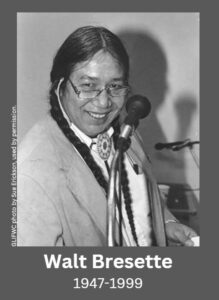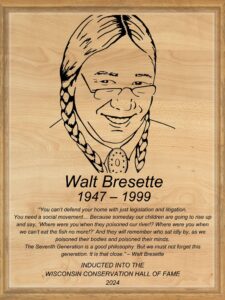Walt Bresette
1947 – 1999
Inductee 2024
“You can’t defend your home with just legislation and litigation. You need a social movement… Because someday our children are going to rise up and say, ‘Where were you when they poisoned our river!? Where were you when we can’t eat the fish no more!?’ And they will remember who sat idly by, as we poisoned their bodies and poisoned their minds. The Seventh Generation is a good philosophy. But we must not forget this generation. It is that close.” – Walt Bresette
Walter Bresette was born on July 4, 1947, on the Red Cliff Reservation of Lake Superior Ojibwe. Catholic school in Red Cliff was followed by high school in Bayfield. In 1965, he attended a summer camp for Indigenous youth at UW-Eau Claire. Walt served four years in the U.S. Army (stationed in Japan) as a communications specialist. After service, Walt expanded into other avenues in communications—art school (Chicago); Indian issues advocacy (Madison, Wisconsin); WOJB Radio (Lac Courte Oreilles); Great Lakes Indian Fish Commission (Odanah, Wisconsin) and first editor of their conservation newsletter, Masina’igan, and then he shapeshifted into public speaking and activism.
school in Red Cliff was followed by high school in Bayfield. In 1965, he attended a summer camp for Indigenous youth at UW-Eau Claire. Walt served four years in the U.S. Army (stationed in Japan) as a communications specialist. After service, Walt expanded into other avenues in communications—art school (Chicago); Indian issues advocacy (Madison, Wisconsin); WOJB Radio (Lac Courte Oreilles); Great Lakes Indian Fish Commission (Odanah, Wisconsin) and first editor of their conservation newsletter, Masina’igan, and then he shapeshifted into public speaking and activism.
Those who fish in northern Wisconsin lakes or in the Wolf River owe Walt Bresette an untold debt for his role in the defeat of the Crandon Mine and the landmark Mining Moratorium Bill. Signed into law by Gov. Tommy Thompson on Earth Day, 1998, it required any metallic-sulfide mining company, before mining in Wisconsin, to prove they had not polluted surface water or groundwater in any of their previous mines in the U.S. or Canada.
 When conservationists and environmentalists think of Walt Bresette’s legacy, they remember him and the non-violent Ogichidaag (protectors of the people) protecting Bad River’s sacred wild rice beds by blockading a train carrying sulfuric acid over rickety tracks to a mine in Michigan’s Upper Peninsula, five miles from Lake Superior.
When conservationists and environmentalists think of Walt Bresette’s legacy, they remember him and the non-violent Ogichidaag (protectors of the people) protecting Bad River’s sacred wild rice beds by blockading a train carrying sulfuric acid over rickety tracks to a mine in Michigan’s Upper Peninsula, five miles from Lake Superior.
When Nature educators think of the storyteller and visionary Bresette, they hear children in Wisconsin public schools debating the merits of protecting land and soil, water and air, forests and fisheries—the public commons—with a proposed Seventh Generation Constitutional Amendment.
Always reaching out to neighbors in Wisconsin and the Upper Great Lakes region, Walter invited non-Indian communities to join Native people in protecting Wisconsin’s and Great Lakes’ precious resources.
View Walt’s 2024 Induction Ceremony Video Below:
RESOURCES:
Videos
Waasa Inaabidaa (“We Look in All Directions”) circa 2000, a PBS series. https://www.youtube.com/playlist?list=PLYzmJ4PMTRYL3OM8M6mf0UPD-UmgsixcB Walt speaks in “We Are All Related” (the Environment program), “That Which is Given to Us” (the Economic program), and “Making Decisions the Right Way” (the Leadership and Governance program).
Oct. 1992: Midwest Treaty Network’s “Treaties Protect the Land” gathering (Treehaven Conference Center) begins with Walt Bresette’s keynote: https://www.youtube.com/watch?v=CEABqNZ3F0Y
Lighting the 7th Fire | POV – PBS (Sandra Sunrising Osawa’s film on restoring Chippewa spearing rights). www.pbs.org › pov › films
————————————————————————————————–
Walleye Warriors: The Chippewa Treaty Rights Story (Bresette and Whaley) 1994; 2015.
https://beechriverbooks.com/books.html
————————————————————————————————–
Seventh Generation Earth Ethics: Native Voices of Wisconsin (Prof. Patty Loew) wisconsinhistory.org. Chapter One is on Walt Bresette and Chapter Two is on Hilary Waukau, Sr. (Menominee)
———————————————————————————————
GLIFWC’s Mazina’igin (premier conservation newspaper in the Upper Great Lakes region)
https://glifwc.org/mazinaigan/
———————————————————————————————————————
The New Resource Wars: Native and Environmental Struggles Against Multinational Corporations (Prof. Al Gedicks)
South End Press (Boston), 1993. Explore online bookstores or order directly from the Center for Alternative Mining Development Policy. e-mail: agedicks@eagle.uwlax. edu
For Walt’s interview in Anishinaabe Niijii (Friends of the Chippewa), order directly from the Center for Alternative Mining Development Policy. same e-mail address as above.
——————————————————————————————————————
Giiwedinong Treaty Rights & Culture Museum
(giiwedinong.org)
————————————————————————————————–
Listen to the Land: Conservation Conversions (Dennis Boyer)
uwpress.wisc.edu › books › 4436 Chapters on Walt Bresette introduce the book’s sections on Seasons.
—————————————————————————————————————————
“Walt Bresette, Ojibwe leader and environmental activist, in WCHF” (Jan. 2024)
The Buzzards Have Landed: The Real Story of the Flambeau Mine (Churchill and Furtman):
The Buzzards Have Landed! is available as a free online download. Click here to access: https://deertailpress.wordpress.com/on-line-access/
——————————————————————————————————–
“Bresette recognized for protecting fish, building bridges” (WSJ, Feb. 2024)
https://captimes.com/opinion/guest-columns/opinion-walter-bresette-recognized-for-protecting-fish-building-bridges/article_4e8baec0-c20e-11ee-9039-87eaec77b318.html
————————————————————————————————————————
Part IV of Unlikely Alliances: Native Nations and White Communities Join to Defend Rural Lands (2017) by Zoltán Grossman
https://uwapress.uw.edu/book/9780295741529/unlikely-alliances/
Instructions: “… Climate Crisis from A to Z” (Elisabeth Kolbert)
www.newyorker.com › 28 › climate-change-from-a-to-z
Instructions from Wisconsin Tribal Leaders on Climate Crisis (Milwaukee Journal Sentinel series)

